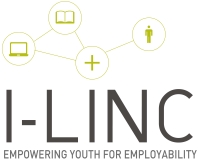I-LINC - Platform for ICT learning and inclusion for youth employability and entrepreneurship
Research area Innovation and education in the digital society | Dr. habil. Bastian Pelka | PD Dr. Christoph Kaletka | Eva Wascher
The project will create a European stakeholder platform with resources and networking for anyone working in the field of inclusion, young people, education and jobs with a focus on ICT (for) learning.

The project was funded by: European Union - Horizon 2020
The main objective of the project is to create a sustainable, cross-cutting platform for ICT (for) learning and inclusion, focused on promoting youth employability. Beyond the technical meaning of "platform" (in the sense of an online environment for networking, participation, and learning), it refers here primarily to the proposal's goal of consolidating an engaged and active community of stakeholders working in the field of ICT (for) learning and inclusion to promote youth employability. The addition of "for" in parentheses attempts to capture the diversity and richness of "ICT for learning and inclusion," which can refer to (but is not limited to) technology-enhanced learning (including MOOCs); digital literacy; digital competencies and e-skills training; e-inclusion (understood as digital training and empowerment, as well as the active socio-economic participation of socially disadvantaged people enhanced by ICT); or ICT platforms created by public/private/third-party organizations for youth employability.
Employability, in turn, includes the most common modalities that can lead to young people's active participation in the economy: Work contracts, internships, apprenticeships, volunteering, self-employment, and entrepreneurial activities. This is only possible if end users (i.e., young people) are actively involved in the entire process - from identifying their needs to developing appropriate solutions.
The Social Research Center (sfs) of the Technical University of Dortmund will link this project to existing networks and activities in the field of social innovation - such as the consortia of the currently running FP7 projects "SI-DRIVE" and "SIMPACT" as well as EUWIN, the European Workplace Innovation Network.
Specific objective 1) To build a broad, rich and active community of stakeholders representing different target groups of young people at risk of exclusion, with the aim of becoming in the long term the largest European ICT (for) learning and inclusion community working to improve the employability of young people.
Specific objective 2) Link existing ICT (for) learning and inclusion stakeholder activities and bring them together to increase their impact both at the level of policy makers and end users.
Specific Objective 3) Contribute to the improvement of existing platforms by creating a common off- and online space for open dialogues and meetings, and promoting active mutual exchange and peer learning activities.
Specific Objective 4) Establish guidelines to improve tools and services for 1) modernizing education and training, 2) youth employability, and 3) addressing the risk of digital and socio-economic exclusion (i.e. e-Inclusion).
Specific objective 5) Contribute to the policy debate on promoting youth employment and entrepreneurship through the development of e-skills, digital inclusion and volunteering, and entrepreneurial skills.
The I-LINC project will start with a quantitative inventory of stakeholder platforms that exist in the field of learning and inclusion for ICT in terms of youth employability and entrepreneurship. Other approaches used in the project are qualitative in nature, such as for identifying best practice case studies. For a participatory needs assessment and solution design process, the I-LINC project will use the design thinking method to find a wide range of new options for social innovation in lifelong learning and eInclusion. With a focus on listening, empathy, holistic thinking, collaboration, and experimentation, the Design Thinking process offers a complementary approach to existing formal prototyping. It will open a new path to innovation and collaboration by moving through different phases - empathizing, defining, ideating, prototyping, testing - that will be used to develop a user-friendly, impactful, and high-quality platform.




![[Translate to English:] [Translate to English:]](/storages/zentraler_bilderpool/_processed_/a/f/csm_Kontakt_b86e8d8ecc.png)
![[Translate to English:] [Translate to English:]](/storages/sfs-sowi/_processed_/6/c/csm_Glasfront_sfs_Header_eae6d325d3.jpg)
